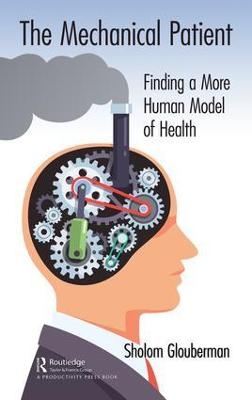
The Mechanical Patient
CRC Press (Verlag)
978-1-138-54994-4 (ISBN)
The Mechanical Patient traces the intellectual development of the chemical/mechanical model of the patient and its implementation. This book names the problem that we have with the mechanical patient and prepares us to respond to its exaggerated place in our society. It provides a historical and conceptual background and explains how the chemical/mechanical model of health gained such a strong hold over our thinking and took the place of the earlier Galenic humoral model. It sketches a promising outline of a more humanized model for understanding health and calls for help to fully articulate it. In that way, it joins a growing movement to go beyond our current chemical/mechanical orientation.
Sholom Glouberman is Philosopher in Residence at Baycrest Health Sciences in Toronto. He has a PhD in Philosophy from Cornell University. His early experience in healthcare was caring for his dying father. He was a planner and adviser at the McGill University Health Centre in Montreal, a Fellow at the King’s Fund in London England, the director of Health Policy for Canadian Policy Research Networks, the director of the International Health Management Program at McGill University and the founder of Patients Canada. He has been an adviser to many healthcare organizations in Canada and the UK. He has spoken before more than 25,000 people around the world. In the last few years he has worked extensively with patients and organizations to create patient partnerships and identify performance targets to humanize healthcare experiences. Sholom Glouberman is Chairman of the Patient Advisory Board of the Registered Nurses Association of Ontario which has 42,000 members. In 2015 he underwent a major surgical procedure and was himself a patient. His direct experience and work with others has helped him see the disparity between the current medical model and patient concerns. He has written four books and many articles.
Author 1 Introduction 2 Aristotle and a Good Life Aristotle (384–322 BC) How Aristotle’s Ideas Can Help Us Understand More about Health 3 Galen’s Four Humors: The First Medical Model Galen (AD 129–c.210) 4 The Renaissance and Roots of the Mechanical Patient, Paracelsus (1493–1541) Francis Bacon (1561–1626) William Harvey (1578–1657) René Descartes (1596–1650) Pierre-Simon Laplace (1749–1827) 5 Robert Boyle: The First Mechanical Patient Robert Boyle (1627–1691) Boyle and Samuel Hartlib Boyle and George Starkey (1628–1665) Boyle and William Petty (1623–1687) Boyle and John Wilkins (1614–1672) Boyle and Thomas Willis (1621–1675) Boyle and Robert Hooke (1635–1703) Boyle and Thomas Hobbes (1588–1679) Boyle and Arthur Coga (1631–1691) Boyle and John Locke (1632–1704) Boyle and Isaac Newton (1642–1727) 6 The Story of Scurvy and the First Failed Controlled Trial George Anson, 1st Baron Anson (1697–1762) James Lind (1716–1794) James Cook (1728–1779) John Pringle (1707–1782) Sir Gilbert Blane (1749–1834) Almroth Wright (1861–1947) Axel Holst (1860–1931) and Theodor Frolich (1870–1947) Ancel Keys (1904–2004) 7 Surgery and the Mechanical Patient John Hunter (1728–1793) Fanny Burney (1772–1840) Ignaz Semmelweis (1818–1865) Joseph Lister (1827–1912) Wilhelm Röntgen (1845–1923) Abraham Flexner (1866–1959) The Mechanical Patient in the Modern Hospital Nurses in the Modern Hospital Lili Elbe (1882–1931) Christiaan Barnard (1922–2001) Surgical Techniques PROMs 8 Medicine and the Chemical Patient Lady Mary Wortley Montagu (1689–1762) Edward Jenner (1749–1823) Louis Pasteur (1822–1895) Robert Koch (1843–1910), Ferdinand Cohn (1829–1898), and Maurice Hilleman (1919–2005) Mary Mallon (Typhoid Mary) (1869–1938) Charles Best (1899–1978), Sir Frederick Banting (1891–1941), and James Collip (1892–1965) The Tuskegee Syphilis Study (1932–1972) and Ethics Gerhard Domagk (1895–1964) Alexander Fleming (1881–1955), Howard Florey (1898–1968), and Ernst Chain (1906–1979) Henrietta Lacks (1920–1951) Ali Maow Maalin (1954–2013) Sam Wagstaff (1921–1987) and Robert Mapplethorpe (1946–1989) Brenda Zimmermann (1956–2014) 9 Genetics and the Return of Individualized Medicine Charles Darwin (1809–1882) An Aside on the Evolution of Human Consciousness Francis Galton (1822–1911) Wilhelm Beiglböck (1905–1963), Karl Brandt(1904–1948), and Josef Mengele (1911–1979) Rosalind Franklin (1920–1958), Francis Crick (1916–2004), and James Watson (1928–) Herbert Boyer (1936–) and Stanley Cohen (1935–) Charles DeLisi (1941–), Pete Domenici (1932–), and Craig Venter (1946–) Angelina Jolie (1975–) Emmanuelle Charpentier (1968–) and Jennifer Doudna (1964–) 10 The Great Mortality Shift Edwin Chadwick (1800–1890) John Snow (1813–1858) Joseph Bazalgette (1818–1891) John Simon (1816–1876) Aneurin Bevan (1897–1960) Rachel Carson (1907–1964) Thomas McKeown (1912–1988) Hubert Laframboise (1924–1991) and Marc Lalonde (1929–) 11 Humanizing Health: The Social/Relational Person The Great Chain of Being Voltaire (1694–1778), Rousseau (1712–1778),Diderot (1713–1784), and Hume (1711–1776) The Enlightenment and Reform James Edward Oglethorpe (1696–1785) Jeremy Bentham (1748–1832) and John Stuart Mill (1806–1873) Richard Wilkinson (1943–) Michael Marmot (1945–) Amartya Sen (1933–) Thomas Piketty (1971–) Finding a More Human Model of Health Bibliography Index
| Erscheinungsdatum | 11.07.2018 |
|---|---|
| Verlagsort | London |
| Sprache | englisch |
| Maße | 156 x 234 mm |
| Gewicht | 367 g |
| Themenwelt | Studium ► Querschnittsbereiche ► Geschichte / Ethik der Medizin |
| Studium ► Querschnittsbereiche ► Prävention / Gesundheitsförderung | |
| Wirtschaft ► Betriebswirtschaft / Management | |
| ISBN-10 | 1-138-54994-0 / 1138549940 |
| ISBN-13 | 978-1-138-54994-4 / 9781138549944 |
| Zustand | Neuware |
| Informationen gemäß Produktsicherheitsverordnung (GPSR) | |
| Haben Sie eine Frage zum Produkt? |
aus dem Bereich


